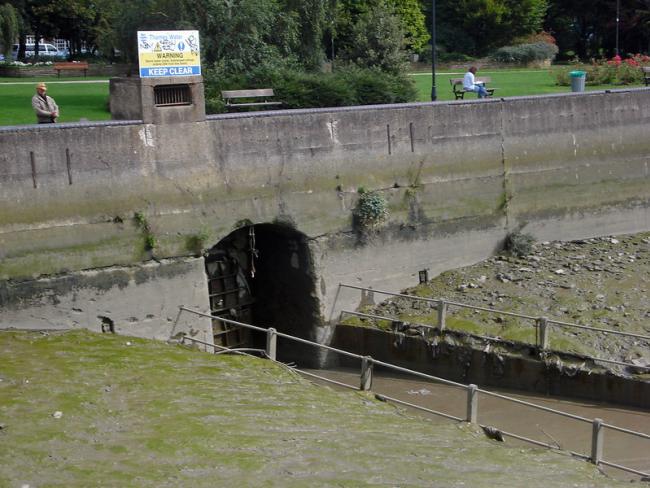7 January 2023

Storm overflow, Hammersmith, West London. Diamond geezer (CC BY-NC-ND 2.0).
After growing pressure from campaigners and the public, Thames Water, England’s biggest privatised water firm, has created what it calls a “near real-time” interactive map showing the scale of its sewage dumping in inland waterways through storm overflows.
And that scale is vast. Hundreds of hours of raw sewage is being discharged through storm overflows. At Marsh Gibbon, a village in Buckinghamshire, raw sewage was discharged on 19 December for 16 whole days. A storm overflow at Standlake in west Oxfordshire discharged 122 hours of raw sewage into the River Windrush on New Year’s Eve. At Windsor, discharges into the River Thames carried on for four hours on 4 January.
Dee O’Connell, of London Waterkeeper – which has been calling on Thames Water to provide real-time data on sewage releases, told The Guardian newspaper, “We need to make sure the data is accurate, but this is important because it gives communities information and enables them to put pressure on the company to invest in local areas to stop this. With this knowledge people can hold the water company to account.”
‘These new proprietors were interested in cash flow, not water flow.’
Ashley Smith, of Windrush Against Sewage Pollution, said: “It shows the extent to which Thames Water is reliant on being able to use our rivers and streams as toilets to deal with problems caused largely by underinvestment and profiteering.”
After privatisation in 1989, the water companies were sold on periodically to new owners, initially to other utility companies, but later to consortiums of banks and private equity and sovereign wealth funds. These new proprietors were interested in cash flow, not water flow, in financial engineering, not hydraulic engineering. They were distant and unaccountable.
Tax free
In the ten years after Australian investment bank Macquarie bought Thames Water, it paid itself and fellow investors £1.6 billion in dividends. It loaded Thames with £10.6 billion debt, and paid exactly no UK corporation tax.
Over half the shares in Thames Water are now owned by a selection of overseas companies, including a Canadian pension funds, a Chinese sovereign wealth fund, and the Queensland Investment Corporation.
Between 1989 and 2018, the English water companies paid out £56 billion in dividends to shareholders. Three of them, Severn Trent, Yorkshire and Anglian, paid out more in dividends in the ten years to 2017 than their pre-tax profit totals. These companies became licences to print money.
In its last year under Macquarie’s control, Thames had to pay a record £20.3 million in fines and costs for dumping raw sewage. In 2018, Thames lost 645.6 million litres a day from leaks. In 2020, that figure was still sky high, at 543 million litres – nearly a fifth of the water entering its pipes.
In 2006, Thames announced a plan to build a new reservoir south west of Abingdon. But it’s taking its time about it. The company’s latest plans are for the reservoir to be on stream by 2037.
Fined
In July 2021, Southern Water was fined £90 million for repeatedly, deliberately and illegally dumping millions of litres of untreated sewage into the sea and rivers over several years.
At privatisation, the government did not give the regulator, Ofwat, powers to prevent all this. In fact, the government gave the companies veto powers over any changes to the terms of a company’s licence. Changes required the company’s agreement.
Ofwat’s first director-general, Sir Ian Byatt, wrote – long after he had retired – “Customers have been overcharged; dividends have been excessive.” He wrote of Thames Water, “Nearly everyone on the board are investors and one cannot resist the idea that they are more concerned with money than with serving the public.”
Corporations by legal definition, that is, by design, are anti-social beings. The corporation’s legally defined mandate is to pursue, relentlessly and without exception, its own self-interest, regardless of the often harmful consequences it might cause to others. As a result, left to their own devices, shareholders will enrich themselves and let society go hang.
Underspent
Ofwat warned in December that the water companies are not investing as much as they pledged to improve sewage treatment and reduce spills. Between 2020 and 2022, 14 companies underspent their budget for improving their water network, and eight underspent their budget for improving their waste water network.
Yorkshire Water spent just 20 per cent of its wastewater enhancement allowance. The main areas of underspending were drought resilience, improvements to sewage treatment works, improvements to storm tank capacity, and reducing spill frequency.
The theft of public resources, the continued fleecing of the public, the lack of research and development, of investment, of improvement, are a major scandal. Of course, the question is why we put up with it.
